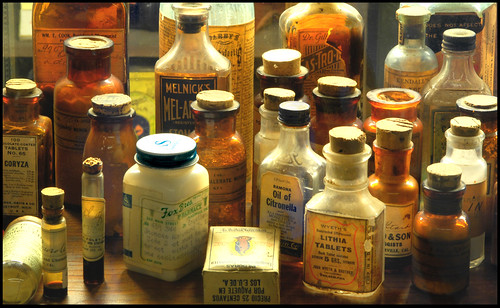A few nice medicine images I found:
Modern medicine of the past

Image by photosbyflick
Some old medicine jars in a window. Lighting was rough but liked the different glass.
Traditional medicine

Image by Julio Martinez
@서울약령시, Yangnyeongsi Herb Medicine Market
Tropical Medicine Course 2010

Image by US Army Africa
Mosquito breeding under way for research and training at Walter Reed Army Institute of Research in Silver Spring, Md., during Tropical Medicine Course (TMC) training Sept. 13, 2010.
U.S. Army photo by Sgt. 1st Class Roddy Rieger
The continent of Africa is home to many tropical diseases, which cause illness and, in some instances, death. Tropical diseases wreak havoc on the social and economic growth of the continent and affect the health and welfare of those who travel.
To combat the affects of tropical diseases, and to ensure the health and safety of all Soldiers operating in the U.S. Africa Command operational area, the Uniformed Services University of Health Sciences, in coordination with the Walter Reed Army Institute of Research, has resurrected the formerly defunct Tropical Medicine Course (TMC) for the 21st century.
The original TMC was taught in 1941 and discontinued in 1991, after 50 years. It was resurrected in 2010 in response to the operational needs of AFRICOM and the Special Operations Command.
Once a six-week long course, it was converted to a targeted short course, and tailored toward non-physician health care providers. The week-long class is now a requirement for all medical professionals deploying to provide health care on the African continent, said Capt. Gabrielle Caldara, environmental science officer with U.S. Army Africa’s Command Surgeon’s Office.
Caldara, Sgt. 1st Class Roddy Rieger, the CSO’s NCOIC, and Staff Sgt. Darren Jones, a medical NCO with USARAF Headquarters Support Company, were the first Army Africa personnel to attend the class Sept. 13-17 at WRAIR in Silver Spring, Md.
The course focused on teaching medical personnel to recognize, diagnosis and treat a range of tropical diseases and ailments that can affect Soldiers who work and travel throughout Africa, said Rieger.
“There were a lot of lectures, seminars and hands on lab practices on things such as leishmaniasis and malaria,” he said. “We learned better ways to recognize symptoms and better ways to treat the problems.”
Among them was the Rapid Diagnostic Test, used to screen patients for malaria. The test uses only a pinprick amount of blood and “is as simple as using a pregnancy test,” Rieger said.
“This particular test allows medical professionals the freedom and convenience to test for the disease without requiring them to transport the patient to a medical facility,” Caldara said.
While Army Africa personnel attending the TMC appreciated the advances in treatment of many tropical diseases, Caldara stressed prevention and education remain key factors in disease prevention.
“This was a great class to understand the intricacies of these diseases, but in the end it all goes back to basics,” she said. “Proper precautions such as uniform treatment, use of DEET/insect repellent, adherence to proper medications and use of a bed net are essential.”
To learn more about U.S. Army Africa visit our official website at www.usaraf.army.mil
Official Twitter Feed: www.twitter.com/usarmyafrica
Official YouTube video channel: www.youtube.com/usarmyafrica